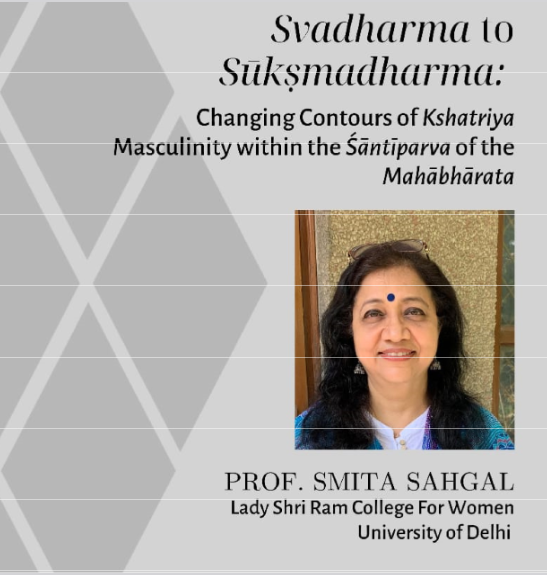
11th September 2024, at 3 PM
Abstract
The talk will focus on the twelfth book, the Śāntiparva or the Book of Peace, which, along with the Anuśāsanaparva constitutes the didactic and normative section of the Mahābhārata. The gender relations and the changing forms of masculinities within the Śāntiparva as it traverses through the concepts of rājdharma, āpaddharma and finally, the mokṣadharma will be discussed. The talk will engage with the notion of svadharma that qualifies Kshatriya masculinity as hegemonic, aggressive, and wealthy with the parallel idea of sūkṣmadharma or subtle consciousness that appears in the text as a critique of perceived Kshatriya svadharma. Finally, we will dwell on how Kshatriya masculinity eventually expanded its horizons to accommodate the idea of ethical consciousness and spiritual awareness in the aftermath of the Great War.
Professor Smita Sahgal teaches at the Department of History, Lady Shri Ram College, University of Delhi. She completed her PhD at the University of Delhi and a second Post-Graduation in Theology from Dayalbagh Educational Institute, Agra. Prof. Sahgal was awarded a teaching chair at the University of Haifa, Israel and was also felicitated by the Romanian Embassy for promoting Indo-European cultural ties. Her publications include several articles, a monograph titled Niyoga: Alternative Mechanism to Lineage Perpetuation in Early India: A Socio-Historical Enquiry and a co-authored book Teaching History. Prof. Sahgal has been awarded research projects by the Indian Council of Historical Research, New Delhi and is currently associated with a Dr Bharat Ram Research Project titled, ‘Recalibrating Kshatriya Masculinity in the Shanti Parva of the Mahabharata: A Reading Against the Grain’.